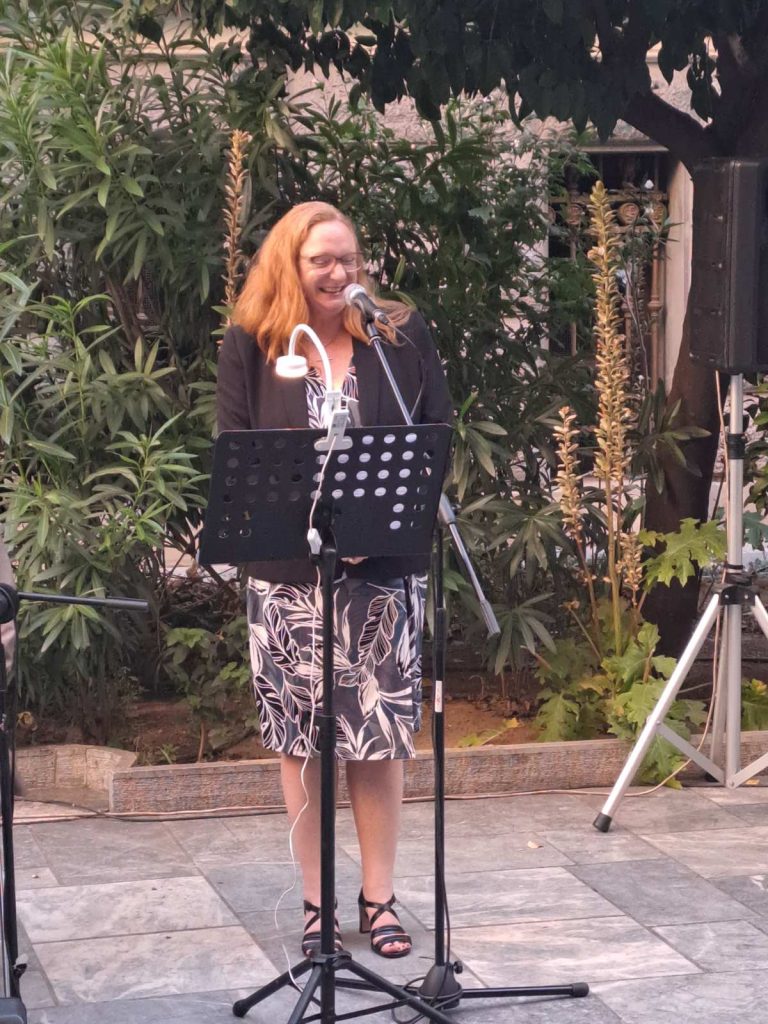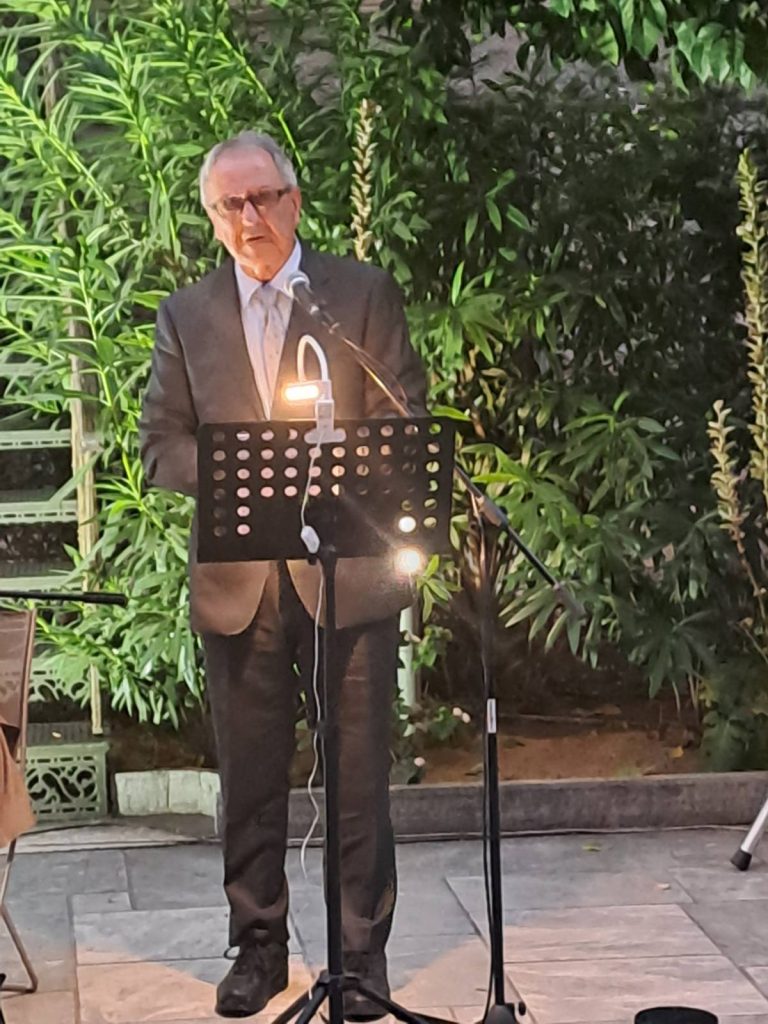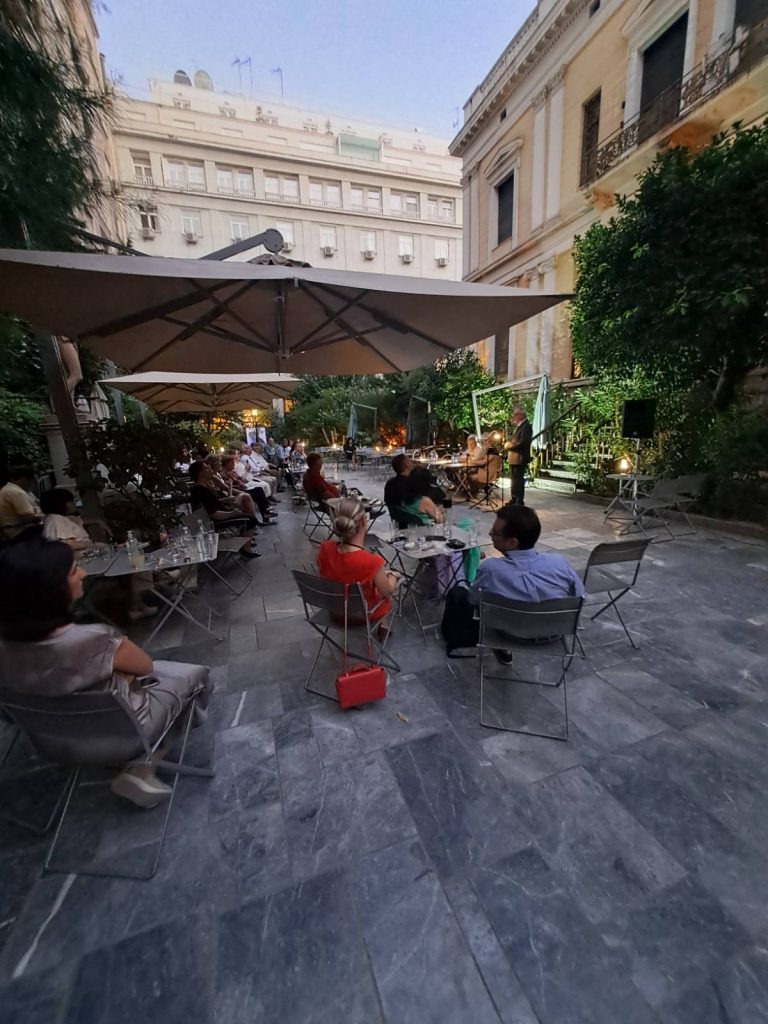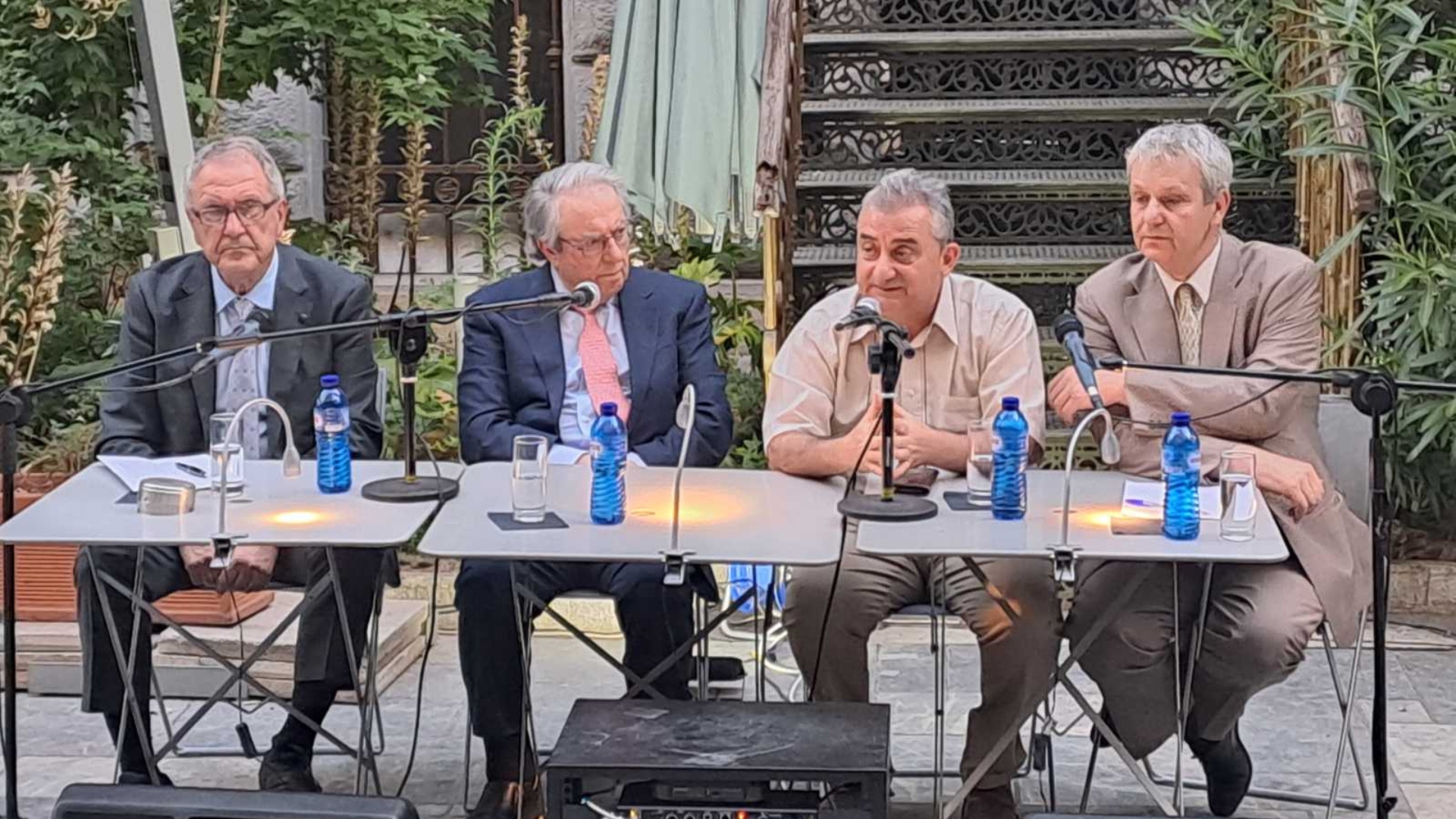Professor Anastasios Tamis’ new book The Aegis of Hellas: Continuing vigour of Philhellenism was launched by The Hellenic Parliament Foundation on Monday, July 17 at 7.30pm (Greek time) at the cafe in the garden of the Numismatic Museum of Athens (12 Panepistimiou Street).
The launch occurred in the presence of a number of distinguished guests including the Australian Ambassador to Greece, Alison Duncan; the Consul General of Greece in the Northern Territory, John Anitomatis AM; the General Secretary of the Hellenic Parliament Foundation, Professor Evanthi Hadjivassiliou; Members of Parliament; the Director General of the National Hellenic Research Foundation “Eleftherios K. Venizelos,” N. Papadakis-Papadis; the former Rector of the National and Kapodistrian University, Professor George Babiniotis; as well as a large number of Greek Australian leaders.
It was a historic day for Greeks abroad as “the presence of Professor Tamis and with the printing and circulation of his most important book on modern philhellenism, we essentially honor the struggles and contribution of expatriate Hellenism”, stressed in his greeting the Secretary General of the Foundation of the Hellenic Parliament, an eminent Professor with extensive work in the study of modern history of Greece, Mr. Evanthi Chatzivassiliou.
Mr Hadjivassiliou then invited Australia’s Ambassador to Greece, His Excellency H. E. Alison Duncan, who welcomed the hostage initially in Greek.
Mrs. Alison Duncan referred to the common struggles of Greece and Australia during the two World Wars and especially the Battle of Crete, the sacrifices of Greeks to defend and rescue hundreds of Australians from the Germans and highlighted the enormous contribution of Australians of Greek descent to the advancement of the economy and culture of modern Australia.

Mrs. Dr. Duncan spoke enthusiastically about Professor Tamis’ book and initially stressed the great contribution of the author to the recording and promotion of the history of Greeks in Australia and the Eastern Hemisphere in general, referred to the contribution of Australian Philhellenes from the world of politics, the Church and the spirit mentioned in Mr. Tamis’ work and stressed the importance of reading the book by a large number of readers.
Then the floor was given to the most eminent Greek lexicographer and hierophant of linguistics, and former Rector and Minister of National Education, Professor George Babiniotis, who referred to the academic and national contribution of A. M. Tamis, “whose work I have followed closely for the last forty years and who connects us with creative friendship”, clarified our reputable linguist (the full content of Mr. Babiniotis’ speech is published separately).

Mr. Babiniotis outlined the evolution of Mr. Tamis’ studies at the University of Melbourne, “one of the twenty most important and best universities in the world”, then referred over time to his teaching as a Lecturer and later Professor at the Universities of Melbourne, Monash, La Trobe and Notre Dame, starting his systematic tertiary studies at the School of Journalism of the Royal Technical University (RMIT) between 1972 and 1974.
“It was a school with high demands: daily language exercises in class to write and analyse news with different topics and different kinds of journalism. The practice of writing the news in a short period of time and even the formulation of its abstract was a valuable preparation for all subsequent writing activity.
In February 1975 he enrolled at the University of Melbourne where he continued his studies until 1986. He followed classical studies (Ancient Greek, Philosophy and History), next to great Hellenists (Homericists and Professors of Epigraphy and Philosophy), as well as Modern Greek studies.”, stressed the eminent Linguist and Lexicographer.
Professor Babiniotis then referred to the most important phases of Professor Tamis’ development, his academic and writing role, and spoke briefly about the establishment and operation of EKEME: “In July 1997, he was appointed Professor and founded the National Centre for Hellenic Studies and Research (EKEME).
It is a university research and study institution, which operates intensively and becomes internationally known. The University cedes six of its buildings for the next 99 years. The Centre also achieves significant self-financing.

The Archives of the Greek Diaspora are transferred there and renamed the Dardalis Archives of the Greek Diaspora.
A team of 12 researchers led by Professor A. Tamis undertakes the digitization of the millions of original and rare documents that he began to collect, later adding rich material from the world of the Eastern Hemisphere.
Original documents of Greek diplomats, documents of Onassis, Konialidis, Greek Kings and Prime Ministers, Presidents of the Hellenic Republic, politicians and influential personalities, are analysed into keywords and made accessible worldwide, with the collaboration of American and Australian electronic companies, as well as a five-year collaboration with the National and Kapodistrian University of Athens, to create an Index mechanism and over 300,000 documents to be stored and accessible internationally on EKEME’s servers” to conclude:
“The thirty years 1993-2023 define the admirable research, writing and publishing activity of Professor Anastasios Tamis, very important in extent, depth and quality for the issues of the Greek Diaspora.
Apart from the familiar area of Australia and New Zealand in Tamis, it also systematically and methodically organizes research programs related to the language, identity and history of Hellenism in the Eastern Hemisphere.
These are original field research, reference books in countries of Central and South America, the Pacific, the Philippines, East and South Asia, including China, Japan and Korea.
His thirty monographs, as well as the eight collective volumes he edited, as well as the dozens of chapters and articles in scientific journals, focus on expatriate Hellenism, its contribution, its ethnolinguistic and religious identity, its relations with other cohabiting nationalities and the major society of the host countries”, Mr. Babiniotis pointed out.
This was followed by the presentation of the book by the Professor of Modern and Contemporary History of Greece, Professor Iakovos Michaelides, who proceeded to a thorough analysis of the project per chapter, building the main thematic pillars of the project.
Mr. Michaelides referred to the importance of philhellenism and the importance of the study to highlight contemporary Philhellenism, a pioneering and extremely important work for the literature, but also for the dynamics of the relationship between Hellenism and the global Diaspora.
He stressed the virtues of the book and its innovation, praised the thorough analysis of the various manifestations of philhellenism as expressed in the first two chapters and touched on the uniqueness of the next four chapters in which A. Tamis developed and highlighted the various forms, as well as the persons and institutions that compose and build the spectrum of Modern Philhellenism.
“The large number of informants, the huge scope of the study, the very adequate documentation, the presence and role of the Greek Diaspora, with its institutions, the organized philhellenism expressed through the struggle for the reunification of the Parthenon Marbles and which took on global dimensions, having Australia as its starting point.
The struggle of expatriate Hellenism to constantly win fans and lovers of the Greek way of life in its host countries, the selfless contribution of the Diaspora at the same time to give birth to new friends in Oceania, Asia and America, the revival of classical Greece by foreign philhellenes, are processes and issues that are highlighted and documented in this work of inspiration of Professor A. Tamis”.
Then, after making a general constructive critique of the book, the Secretary General of the Hellenic Parliament Foundation, Professor Evanthi Chatzivassiliou, as coordinator of the event, pointed out the main thematic axes of the book and the areas of knowledge added by the study.
“It is a record and analysis of multiple forms of interest in Greek culture – from ancient times to the present day – around the world. The book examines not only the Greek Diaspora, but also the various cultural networks formed by people who study Greek culture as a spiritual point of reference. Of course, the scope of this research effort is enormous.
It is a testimony to the resilience, strength, modern character, radiance of Greek culture and communities of the Greek Diaspora.
On the other hand, it examines this radiation as one of the many factors shaping the modern world and seeks to place the influence of global Greek culture and heritage in their appropriate context, temporally, geographically and historically,” said Professor Hadjivassiliou.
The last speaker was the author, Mr. Tamis, who, after thanking all those who collaborated in the publication of the book, sponsors and researchers, informants, then briefly referred to the two types of philhellenism, namely Classical Philhellenism and Modern Philhellenism, briefly analysing their differences.
“I identify these two main aspects and note that sometimes there can be overlap and divergence between their respective objectives. By Classical Philhellenism I mean the study and appreciation of ancient Greek society – its history, literature, art and philosophy. However, classical Philhellenism also has the dimension that ancient Greece remains timelessly relevant and a source of ideas and values of a past that continues to inspire, influence and guide.”
Mr. Tamis stressed that there is, of course, a wider problem for the Humanities, because governments increasingly discredit and trivialize the Arts and Classics and Humanities, insisting that universities need to be much more attuned to the needs of the economy and the workforce and devote much more time to teaching (without learning literacy, without man), and training – and this has already brought about the abolition or marginalization of many old fields of study (Schools of Art Aesthetics, Departments of Education, Music, Theology, Language and Linguistics, Philosophy), which inform us about the foundations and history of Western civilization.
Let me add that learning, not teaching, should certainly be the primary characteristic of a university, and teaching should only be an element of this, a simple process, not the replacement for learning, because it is knowledge that leads to education and man.
Societies without learning, societies trained by technocrats but without education are societies without sensitive citizens, without participating citizens, societies with qualified individuals who will be the first to be levelled by the coming storm of robotics.

